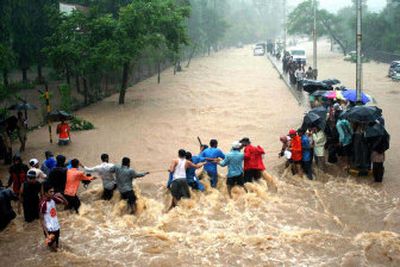Record rain drenches India

BOMBAY, India – The rain looked like a solid wall of water, and it just kept coming. Soaked, frightened parents walked for hours Wednesday to reach their children. Motorists spent the night marooned on traffic islands, watching bodies float by.
Victims were crushed by falling walls, trapped in cars or electrocuted as phone networks collapsed in torrential downpours – the strongest rains ever recorded in India.
Every year, Bombay is brought to a halt for a day or two by heavy monsoon rains that drench the country between June and September and often leave hundreds dead nationwide. But scenes like these have never before been seen in this cosmopolitan city, also known as Mumbai, which is home to India’s financial and movie industries.
“Most places in India don’t receive this kind of rainfall in a year,” said R.V. Sharma, director of the meteorological department in Bombay.
About 200 bodies were recovered after 37 inches fell in one day, and an additional 100 deaths were feared across Maharashtra state, where Bombay is the capital, according to deputy chief minister R.R. Patil.
Traffic was backed up all night and into Wednesday across Bombay, with drivers abandoning their vehicles on roads turned into waist-high rivers.
Rajesh Khubchandani, a businessman, left his car and spent 15 hours marooned with several other people on a traffic island. “We saw two bodies floating past. I don’t know how they died,” Khubchandani said.
At one point, about 150,000 people were stranded in railway stations, state-run All India Radio reported. Others stayed for hours on buses and trains surrounded by swirling water.
“We were stuck in a bus all through the night with nothing to eat or drink. It was impossible to get out because there was water all around,” said Yamini Patil, a government employee.
Television footage showed crowds of people scrambling for food parcels dropped from helicopters by navy rescue teams as the bodies of two men lay sprawled in the streets of a Bombay neighborhood.
While Wednesday’s precipitation was still being totaled, officials said parts of the city had been hit by up to 37.1 inches of rain Tuesday, much of it falling over just a few hours.
Maharashtra’s top elected official, Vilasrao Deshmukh, ordered a two-day work stoppage Wednesday to keep workers at home, and called out the military to help.
“Inflatable rafts will be used to reach stranded people. Please try to stay where you are,” he said.
As floodwaters started subsiding Wednesday afternoon, the city began, just barely, to function. The road into Bombay’s financial hub was cleared, though the two main highways, as well as hundreds of smaller roads, remained gridlocked. Skeletal train services connecting downtown areas to the suburbs resumed Wednesday afternoon, and flights at the airport resumed later.
Param Singh wept with relief after he walked nine hours through rain-flooded streets to reach his daughter’s school, where she was among the hundreds of schoolchildren who spent the night in suburban schools.
“It was horrible not knowing where she was, if she was stuck in a bus or alone at home since my wife is out of Bombay on work. I literally wept when I saw her,” said Singh, his clothes drenched as he hugged his daughter.
Rescuers started arriving Tuesday night in the village of Kondivali, 95 miles south of Bombay, hoping to extricate nearly 100 people trapped by a landslide, said police officer S. Jadav. At least 30 more people were feared buried in another mudslide in the nearby village of Jui.
“We have no information from them, all lines are dead,” said another officer, P. Ranade.
State police reported other landslides in Maharashtra’s Raigad, Ratnagiri, Sindhudurg, and Kolhapur areas. Details weren’t immediately available.
Home Minister Shivraj Patil said 633 people have died nationwide since June 1 in the heavy seasonal rains, which have washed away tens of thousands of homes, roads, railway tracks and bridges.
India’s previous heaviest rainfall, recorded in the northeastern town of Cherrapunji – one of the rainiest places on Earth – was 33 inches on July 12, 1910, Sharma said.